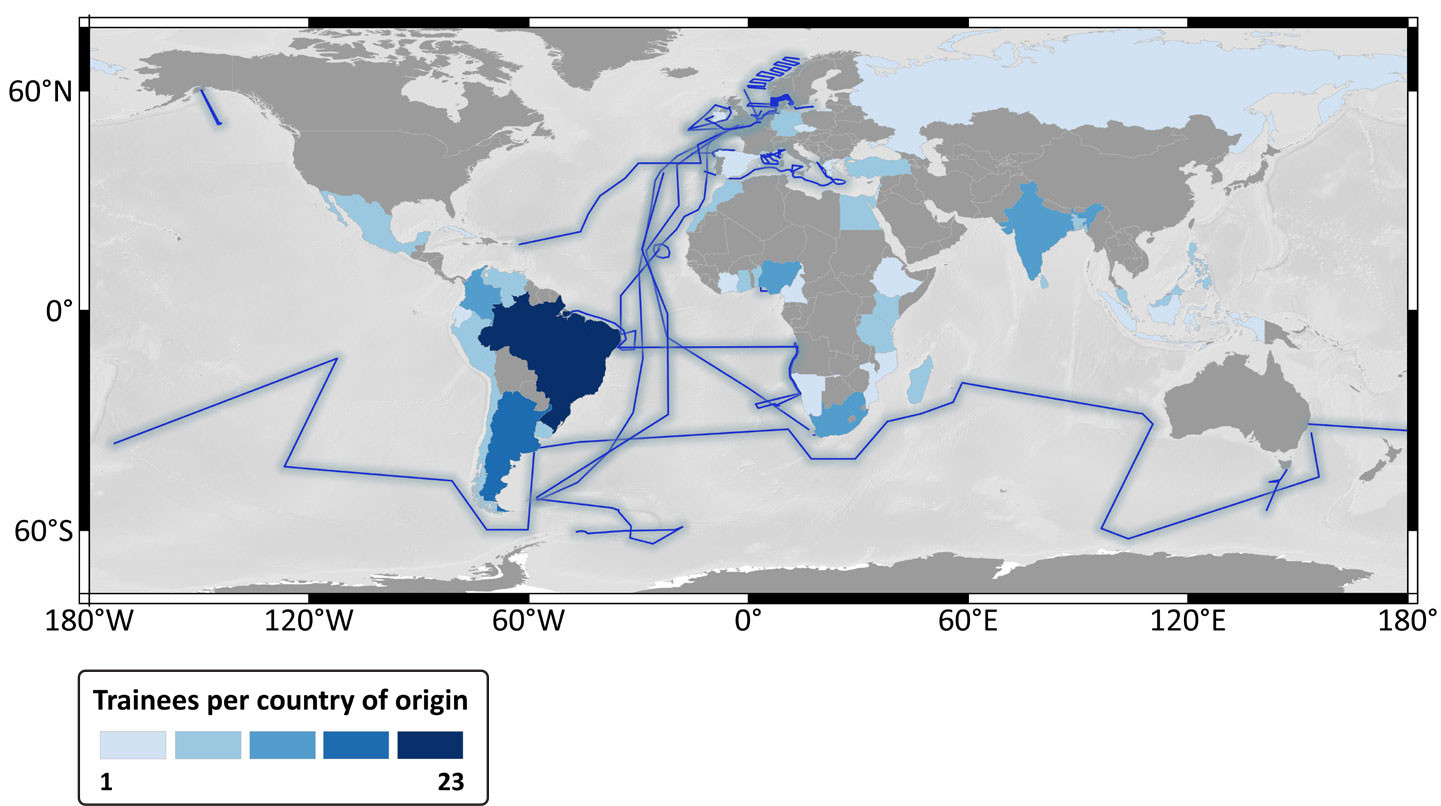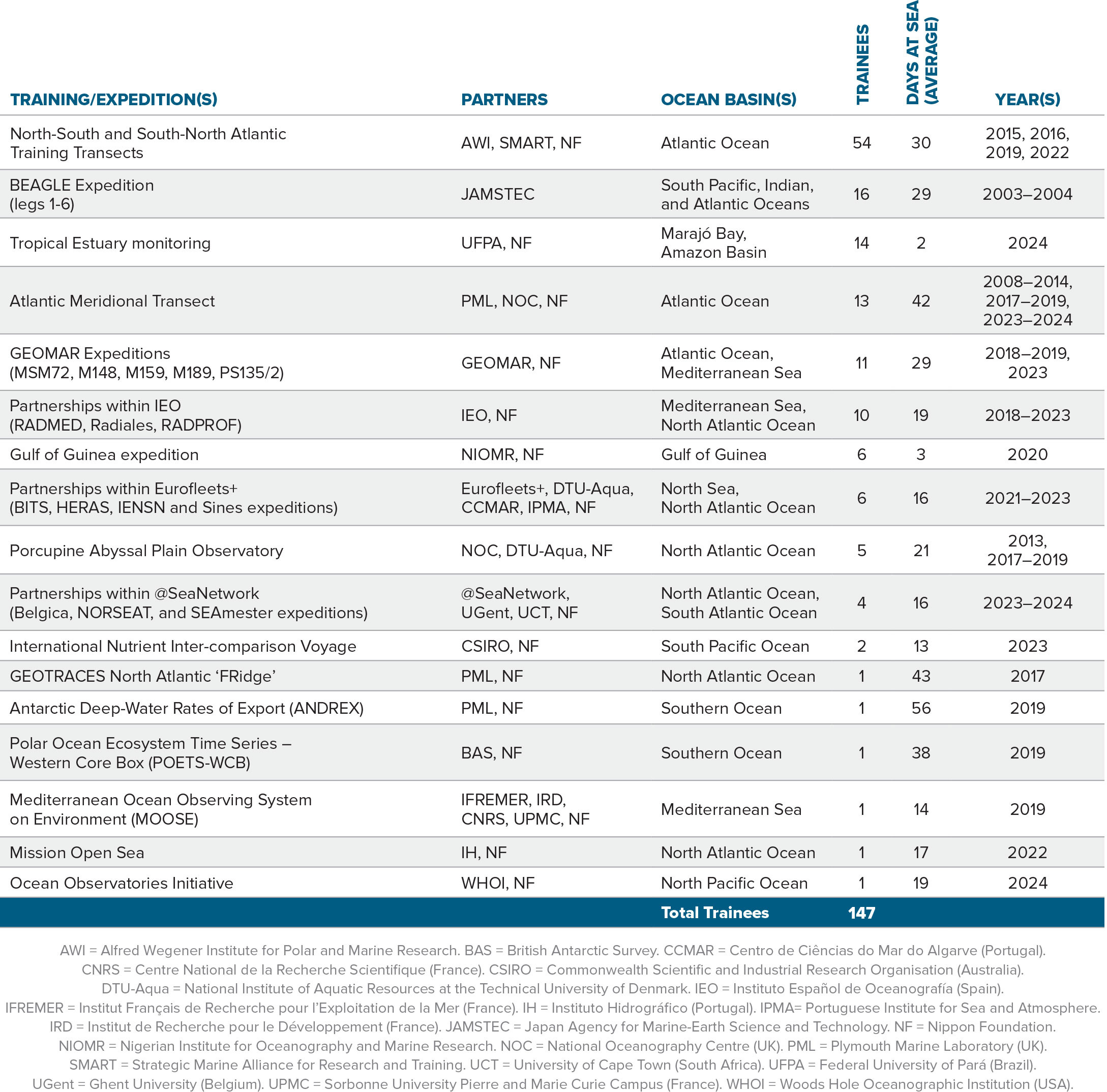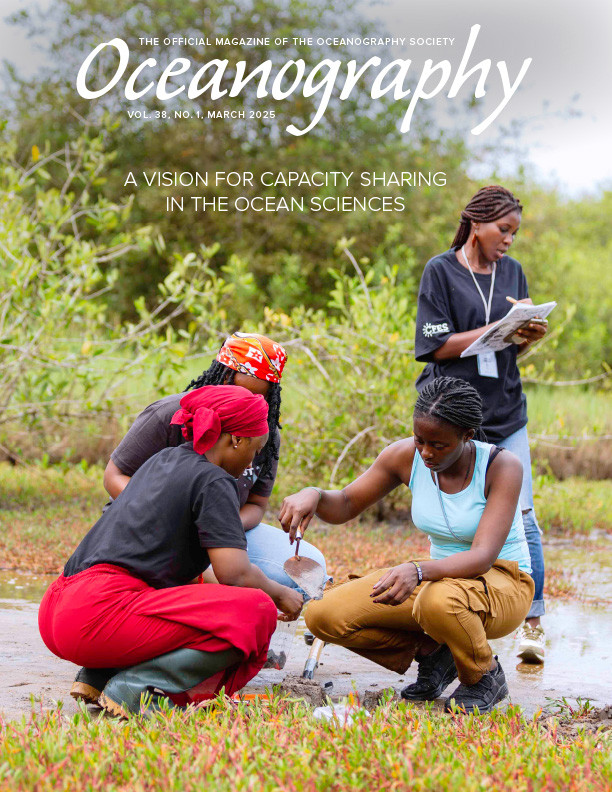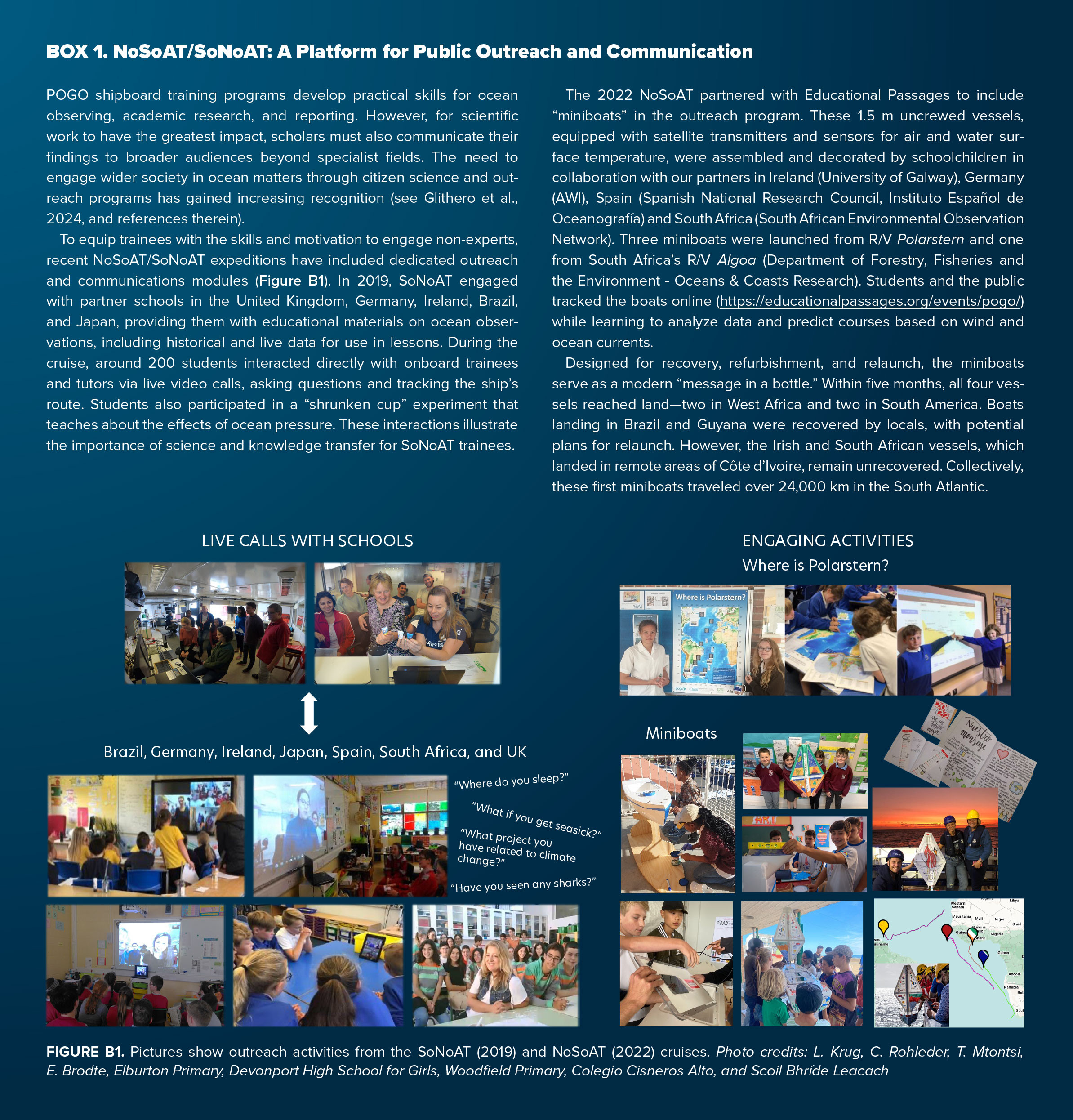The POGO Shipboard Training Program
Observing the ocean is critical not only for understanding its natural cycles but also for monitoring the impacts of human activities, predicting changes, and providing evidence to support management strategies that protect and restore marine ecosystems and resources (GOOS Strategy, 2019). Nonetheless, opportunities to observe the ocean are limited by scientific, technological, and financial resources, particularly for those from developing nations (IOC-UNESCO, 2020). The Partnership for Observation of the Global Ocean (POGO, https://www.pogo-ocean.org/) is committed to addressing this imbalance by providing training, networking, and technology transfer opportunities for scientists and institutions in developing countries in order to enable development of new self-sustaining ocean science and observational communities (e.g., Krug et al., 2021). The variety of approaches taken include supporting development of low-cost instruments (e.g., Marcelli et al., 2021), citizen science initiatives (e.g., Catarino et al., 2023), and outreach and advocacy.
As highlighted by the Global Ocean Science Report (IOC-UNESCO, 2020), the greatest need remains in increasing human capacity. Over the last 25 years, POGO has built a capacity development program that focuses on new generations of experts and leaders in ocean science and observations. It includes visits to state-of-the-art laboratories in advanced oceanographic institutions (e.g., Krieger et al., 2025, and Seeyave et al., 2025, both in this issue), regional training adapted to local resources and conditions (Urban and Seeyave, 2021), and training onboard research vessels.
The POGO shipboard training program is primarily aimed at early-career scientists, technicians, postgraduate (PhD or MSc) students, and postdoctoral fellows who are nationals of and working in developing countries or countries with economies in transition. However, a limited number of opportunities are also available for individuals from developed countries. The program is designed to equip participants with essential at-sea technical skills that should benefit development of their careers. Trainees gain valuable knowledge by working onboard state-of-the-art research vessels with advanced equipment under the guidance of experienced researchers, often collaborating within interdisciplinary teams. Furthermore, the program prepares participants to address real-world challenges encountered in the field by fostering a deeper understanding of the marine environment’s complexities. It also cultivates a strong sense of responsibility for ocean protection, encouraging trainees to share their experiences through onboard science communication and outreach activities (see Box 1).
The POGO shipboard training program began in 2003, in partnership with the Japan Agency for Marine-Earth Science and Technology (JAMSTEC), with 16 trainees participating in six different legs of the BEAGLE expedition aboard R/V Mirai. Five years later, the Atlantic Meridional Transect (AMT) Shipboard Training Fellowship was established in collaboration with Plymouth Marine Laboratory (PML), funded by the Nippon Foundation (NF). In 2015, POGO and NF supported Alfred Wegener Institute Helmholtz Centre for Polar and Marine Research (AWI)’s first floating summer school, known as the North-South Atlantic Training Transect (NoSoAT). From this partnership between POGO, NF, AWI, and the Strategic Marine Alliance for Research and Training (SMART), the Ocean Training Partnership was established in 2017.
POGO training opportunities onboard research vessels can occur through grants that support training-dedicated cruises (e.g., NoSoAT) or fellowships for individuals to join research cruises with the option of pre- and/or post-cruise training periods at a host institute (e.g., AMT fellowships). In the latter case, principal investigators (PIs) leading or involved in research cruises can apply to host one or more fellows either for a “Targeted Fellowship” or an “Open Fellowship.”
The Targeted Fellowship involves the PI’s institution requesting support for a known ECOP from a developing country, with the purpose of strengthening existing collaborations among institutions in developed and developing countries. The Open Fellowship, on the other hand, involves the allocation of places via a candidate selection process. In this case, POGO coordinates a call for applications and manages the evaluation process with the host institution to select the successful applicant(s). These calls usually occur three to six months before the cruise begins, allowing time for reviewing a large volume of applications and interviewing short-listed candidates. This timeline also ensures that successful candidates have adequate time to complete the necessary paperwork and pre-cruise training certifications, as required. However, occasionally, a berth becomes available at shorter notice. Therefore, NF-POGO launched the annual Open Call for Shipboard Training Fellowships in 2019. The Open Call application requires a letter of support from the candidate’s supervisor and an application form that collects details about the candidate’s travel availability during the year, qualifications, and specific training interests, including geographical areas and research topics. When training opportunities arise at short notice, POGO evaluates the Open Call candidates’ suitability for the specific offer.
POGO advertises its shipboard training opportunities through its official website, mailing list, and newsletter, and on social media platforms and the Ocean Training Partnership portal. Announcements are then re-shared by member institutions, academic networks, and the NF-POGO Alumni Network for the Ocean (NANO), reaching a broad audience.
To date, 147 ECOPs (55% female, 45% male, and 1% other) from 43 countries in Africa, Asia, Europe, and Latin America have received training through the POGO shipboard training program (Figure 1; Table 1).

FIGURE 1. Country of origin of trainees and cruise tracks from the POGO shipboard trainings. A total of 147 early career ocean professionals from 43 countries in Africa, Asia, Europe, and Latin America have participated. > High res figure
|
TABLE 1. List of shipboard trainings provided by POGO and partners, ordered by total number of participants. > High res table

|
The North-South Atlantic Training Transect
The North-South (South-North) Atlantic Training Transect (NoSoAT/SoNoAT) is hosted on transit expeditions of R/V Polarstern (AWI, 2017), while the vessel travels between the ship’s home harbor in Germany and the Southern Hemisphere. There have been four floating summer schools to date (2015, 2016, 2019, and 2022), each typically accommodating 25 to 35 trainees and seven to 10 instructors representing multiple nationalities (Figure 2). Over the course of one month, trainees engage in an intensive program that combines both practical and theoretical sessions. Vertical cast samplings are performed at stations using various oceanographic devices, alongside en route sampling via the ship’s underway system. Trainees are organized into smaller groups and rotate through various disciplines, including core topics and others that change from year to year. The topics include oceanography, microbiology, climate and atmosphere, ocean and climate governance, remote sensing, bathymetry, art and science, and outreach and science communication. The modules are taught by a diverse team of instructors that includes researchers, professors, and technicians. The program culminates in a final sampling station, led and run entirely by the scholars, as well as presentations of individual short projects conducted by the trainees in parallel with the other activities.
NoSoAT/SoNoAT offers a unique learning environment by combining hands-on experience with interdisciplinary and international exposure. The program promotes the development of independent research skills as well as collaborative work and encourages trainees to bridge the gap between the scientific community and the public. Related outreach and science communication activities have produced content for social media and engaged with school children from various countries (see Box 1 for details).
The Atlantic Meridional Transect (AMT)
Initiated in 1995, the AMT crosses more than 100° of latitude and a range of ecosystems, from subpolar to the tropical Atlantic Ocean, between the United Kingdom and destinations in the South Atlantic (see Rees et al., 2024). The program provides a platform for multidisciplinary ocean research and international scientific collaboration in a stimulating environment. Since 2008, POGO fellows have joined the cruises to participate in scientific activities where they gain essential research skills and professional development (Figure 2). In addition, fellows spend periods pre- and post-cruise at the host institution (either PML or the National Oceanography Centre) to help with logistics, complete sea survival training and medical examinations required to board British vessels, and learn to analyze and interpret research results.

FIGURE 2. (left) South-North Atlantic Training Transect (SoNoAT) scholars are gathered with Chief Scientist Karen Wiltshire and teaching team member Peter Lemke onboard R/V Polarstern in 2019. (right) POGO fellow Yessica Pacheco with supervisor Marika Takeuchi and PhD student Jack Williams work with a marine snow catcher during the Atlantic Meridional Transect-30 cruise. Photo credits: F. Beckman and W. Major. > High res figure
|
Through individual training opportunities such as the AMT program, fellows receive personalized guidance from a dedicated supervisor before, during, and after their cruises. This gives them a more comprehensive learning and networking experience as they spend periods of study/work at the host institution, collaborate with the research teams, and participate in the institution’s daily routine. It is not uncommon for trainees to keep in close contact with their scientific hosts and publish results with them (e.g., Tilstone et al., 2017).
Training Impacts and Knowledge Transfer
Since 2015, POGO has sent out four surveys to former trainees (who completed training at least five years prior) as a means for evaluating the long-term impacts of the fellowships in terms of sustained capacity development. The surveys include questions on background, demographics, and direct or indirect professional and career-related impacts of the training. Responses have been received from 38 shipboard trainees, equivalent to 42% of all shipboard training fellows between 2003 and 2019.
The alumni were asked about their positions at the time of training, their current positions, and whether the training has helped them to obtain their current positions. Most respondents (52.6%) were students, and 42% of them had master’s degrees at the time of their training. At the time of answering the survey, the respondents were PhD students (19%), postdoctoral fellows (16.7%), lecturers/professors (14.3%), junior/senior researchers (14.3%), or other less represented categories, which included directors or deputy directors (Figure 3).

FIGURE 3. Responses to surveys shown here indicate the impacts of POGO shipboard training on past trainees’ education and careers and their current positions (n = 38). > High res figure
|
Trainees were asked about the impacts of the training on their educations and careers, and on their professional positions. Responses indicated that the shipboard training was highly relevant to all aspects, especially enhancing networking and collaboration opportunities and securing more fulfilling and permanent positions). Testimonials frequently confirmed that the training helped them secure PhD positions in their home countries or abroad.
About 85% of survey respondents had the opportunity to share the knowledge acquired during the training by presenting lectures or seminars. Likewise, 74% of them had supervised at least one student and/or colleague since their training. Three in every four survey respondents stated that they were able to pass their knowledge on to those they supervised. Past trainees were also asked about tangible scientific and outreach outcomes from their training: 47.4% of respondents had published at least one peer-reviewed research article, 52.6% had posted at least one popular science article on social media, and 65.8% had contributed data from their training to databases.
These results indicate the strong potential for knowledge transfer and a “cascade” effect from the training, whereby the benefits reach a broader audience than just the initial trainees. Over the years, students or former students of POGO trainee alumni have received fellowships themselves.
Impact and Future of POGO’s Shipboard Training Program
POGO, with its network of over 55 member institutions, and its partners have successfully established an international shipboard training program tailored to meet the specific needs of different trainees and training providers. The program offers a range of opportunities that include both one-on-one focused and multidisciplinary group training, accommodates scholars from undergraduates to postdoctoral fellows, and uses vessels of varying sizes, from small boats in estuarine environments to large transoceanic icebreakers. This flexibility allows us to work with a multitude of partners in a collaborative endeavor that does not rely heavily on a single institution or ship to provide training With in-kind contributions from our partners, this form of training can be very cost-effective, requiring only the cost of a return flight in cases where there is no pre- or post-cruise training. In cases where the trainees are recruited from the same or neighboring countries, the training can also be self-funded, as is generally the case with European shipboard training opportunities (e.g., Eurofleets+). Nonetheless, to be truly global and inclusive, this type of training requires dedicated funding, and the Nippon Foundation has been instrumental in providing a large number of fellowships.
The success of the POGO program builds on the following aspects:
- Young oceanographers have the opportunity to work closely with experienced researchers, building professional relationships and fostering collaboration, which is essential for their future careers.
- Trainees gain a deeper understanding of the ocean as an interconnected system and see firsthand how their work contributes to broader environmental and scientific objectives.
- The program is teaching future trainers, and the knowledge is being passed on to a broader audience through training, supervision, and mentorship.
In the longer term, our objectives are:
- To expand the partnership to offer training in the Pacific and Indian Oceans.
- To diversify our training programs by working with regional and other international groups, such as the new @SeaNetwork.
By continuing and expanding our efforts in providing shipboard training to ECOPs in developing countries, and consistently evaluating the effectiveness of our program, we will further strengthen and distribute ocean observing capacity more globally, contributing to addressing Vision 2030’s Challenge 9 (Skills, knowledge and technology for all; Arbic et al., 2024).
Acknowledgments
Nippon Foundation, Federal Ministry for Education and Research, Reederei F. Laeisz, ATLANTOS, Mercator Stiftung, MarineTraining.eu, all partner organisations, collaborators, supervisors and trainees. AMT is funded by the UK Natural Environment Research Council through its National Capability Long-term Single Centre Science Programme, Atlantic Climate and Environment Strategic Science - AtlantiS (grant number NE/Y005589/1). This study contributes to the international IMBeR project and is contribution number 414 of the AMT programme.


 > High res box
> High res box


